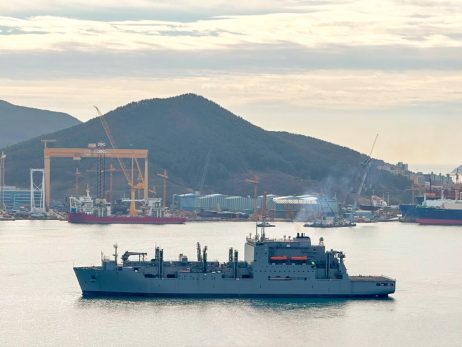Introduction: South Korea’s MASGA Proposal
The recent proposal from South Korea known as “Make American Shipbuilding Great Again” (MASGA) has the potential to significantly reshape the landscape of U.S. shipbuilding. This initiative, crafted during trade negotiations, seeks to foster greater industrial cooperation between the two nations, potentially marking a new chapter in their alliance.
The MASGA Proposal: Key Components
At the core of the MASGA proposal is an ambitious investment plan that forecasts a staggering $150 billion influx from South Korean shipbuilders into the U.S. maritime sector. This investment is earmarked for:
- Upgrading U.S. shipyards
- Training American workers in modern shipbuilding techniques
- Assisting with U.S. Navy maintenance backlogs
- Co-producing vessels within U.S. territory
This multi-faceted approach not only addresses existing infrastructural challenges but also aims to cultivate a skilled workforce ready to meet the demands of an evolving maritime landscape.
The Motivation Behind MASGA
Negotiations were ripe with tension when the U.S. threatened to impose a hefty 25 percent tariff on South Korean exports in mid-2025. This development echoed a growing narrative of trade protectionism and raised the stakes significantly for both countries. Ultimately, a compromise led to a 15 percent tariff in exchange for the MASGA initiative, which cleverly ties itself to broader economic and industrial goals. The name itself, echoing a certain political slogan, emphasizes the strategic interplay of diplomacy and domestic politics.
Addressing Structural Issues in U.S. Shipbuilding
The U.S. has faced an ongoing decline in its shipbuilding sector since the end of the Cold War, characterized by a shrinking number of operational shipyards with increasingly outdated infrastructure. Key issues include:
- A shortage of skilled labor
- Prolonged program delays
- Growing backlogs in maintenance and repair operations
With U.S. shipyards struggling to keep up with existing demands, a broader plan for fleet expansion—namely the push for a 355-ship navy—now seems less feasible without international support.
South Korea: A Powerful Ally in Shipbuilding
On the flip side, South Korea remains a juggernaut in global shipbuilding, exemplified by companies like Hyundai Heavy Industries und Samsung Heavy Industries. These firms are noted for their efficiency in delivering sophisticated vessels both on time and within budget. Collaborating with South Korean firms could significantly enhance the U.S. shipbuilding capacity, allowing for a seamless integration of advanced technologies and methodologies.
Joint Ventures and Technology Transfer
The heart of MASGA lies not merely in investment but also in fostering collaboration through joint ventures and technology transfer. U.S. shipyards can benefit from:
- Shared design and production techniques
- Exposure to advanced automation systems
- Integrated supply chain management
The promise of the MASGA initiative is that it will not only improve production efficiency but also create a skilled workforce through targeted training programs, ensuring compliance with U.S. content laws while enhancing local capabilities.
The Strategic Importance of MASGA
Shipbuilding stands as a strategic sector that underpins national security and capability. MASGA, if executed correctly, could transform a contentious trade negotiation into a potent strategy for long-term alliance integration. By embedding South Korean firms within the U.S. shipbuilding framework, both countries can cultivate a robust economic interdependence, strengthening their geopolitical alignment.
Potenzielle Herausforderungen vor uns
Though the MASGA proposal carries significant promise, it faces several hurdles. U.S. labor unions and shipyard operators have historically resisted foreign participation, fearing competition and the loss of jobs. To navigate these waters successfully, the initiative must be framed as a means of building capacity domestically rather than outsourcing jobs abroad.
One approach might involve studying successful international partnerships in the aerospace sector, where collaboration has been politically acceptable while achieving industrial output goals.
The Path Forward: Implications for the Logistics Sector
The implications of MASGA extend beyond shipbuilding. The initiative can significantly impact the logistics sector, particularly in transport and distribution channels. Enhanced shipbuilding capacity may lead to increased efficiencies in cargo transport, potentially alleviating supply chain congestion and improving delivery timelines. As more sophisticated vessels roll out of American shipyards, logistics operations could expect smoother flows, from hauling goods to MRO services, addressing both logistical demands and operational readiness.
Schlussfolgerung
The MASGA proposal stands to not only rejuvenate U.S. shipbuilding but also redefine the nature of American-South Korean relations in a rapidly changing geopolitical landscape. As logistics intertwine with these developments, it is evident that robust transportation and efficient supply chains will remain at the forefront of ensuring national security and economic resilience. Ultimately, GetTransport.com is here to simplify logistics, providing reliable, affordable solutions for cargo movements on a global scale. For your next delivery, consider the convenience and reliability that GetTransport.com offers. Book your cargo transportation with GetTransport.com today!

 South Korea’s Bold MASGA Proposal and Its Impact on U.S. Shipbuilding">
South Korea’s Bold MASGA Proposal and Its Impact on U.S. Shipbuilding">